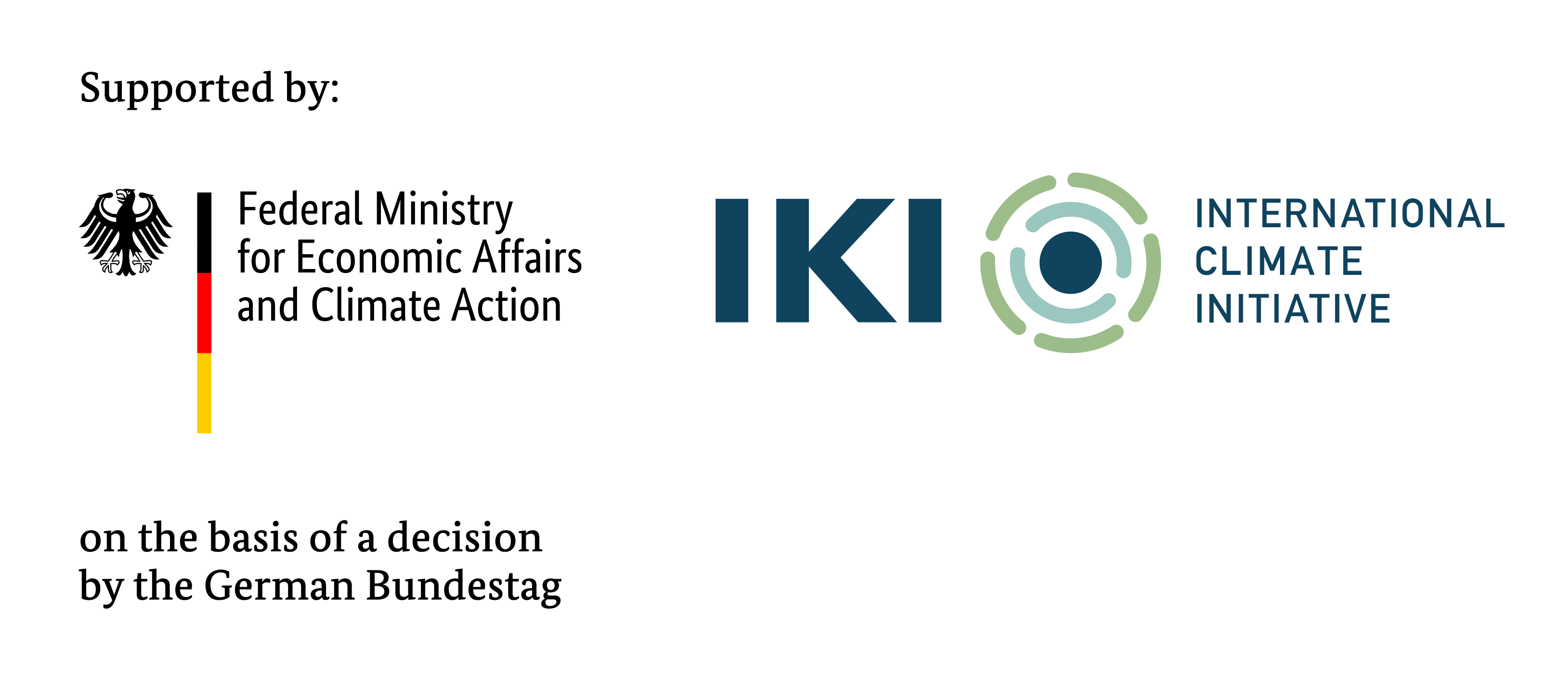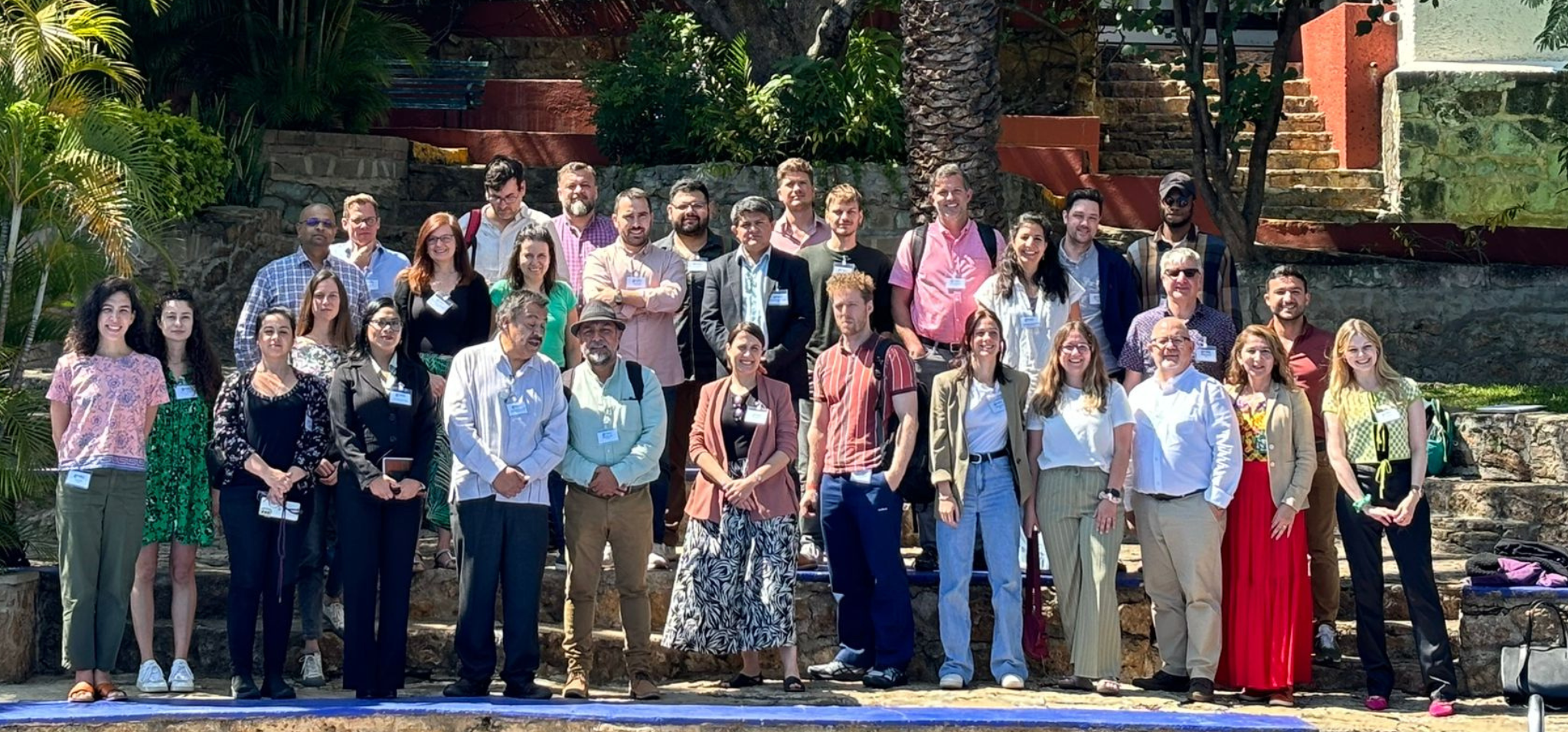
Author: Maria Diaz (SDSN).
In Oaxaca, Mexico, on November 4th, the FABLE Consortium hosted its 15th bi-annual meeting, scheduled back-to-back with the Global Land Programme Open Science Meeting. The consortium meeting brought together FABLE country teams, Mexican policymakers, and a diverse group of international and local experts in person and online. The discussions centered on addressing challenges and exploring innovative solutions to strengthen policy coherence and align national actions with global sustainability goals for food and land-use systems. A key focus was the critical role of scientists in supporting government efforts, with sessions emphasizing the importance of local-to-global approaches, focusing on Mexico’s evolving agricultural policies.
Keynote address: Current overview and experiences in sustainable agricultural territorial planning in Mexico
The meeting began with a keynote from Juan Manuel Torres Rojo, former Director of the National Program of Reforestation and current Coordinator of FABLE Mexico. The keynote offered a comprehensive overview of Mexico’s agricultural transformation, tracing its origins to the 1940s when the government began offering direct transfers to producers. These early policies sought to offset potential losses under NAFTA and laid the foundation for future agricultural reforms.
Over the decades, Mexico’s agricultural sector has gone through several modernization phases, yet the need to support smallholders, who make up 55% of Mexican farmers, remains a priority. Despite their prevalence, large-scale producers dominate the market, resulting in uneven profitability across the country. Additionally, unsustainable water use practices pose a significant challenge, with many producers benefiting from water concessions without paying for consumption, leading to inequitable and unsustainable usage.
The overarching goal of Mexico’s agricultural policies is food self-sufficiency, with notable successes in crops such as rice, beans, and corn. However, smallholders still require considerable support, particularly in capacity building and the adoption of sustainable farming practices. The government has reduced direct subsidies to larger producers, emphasizing the need for sustainability at the grassroots level.
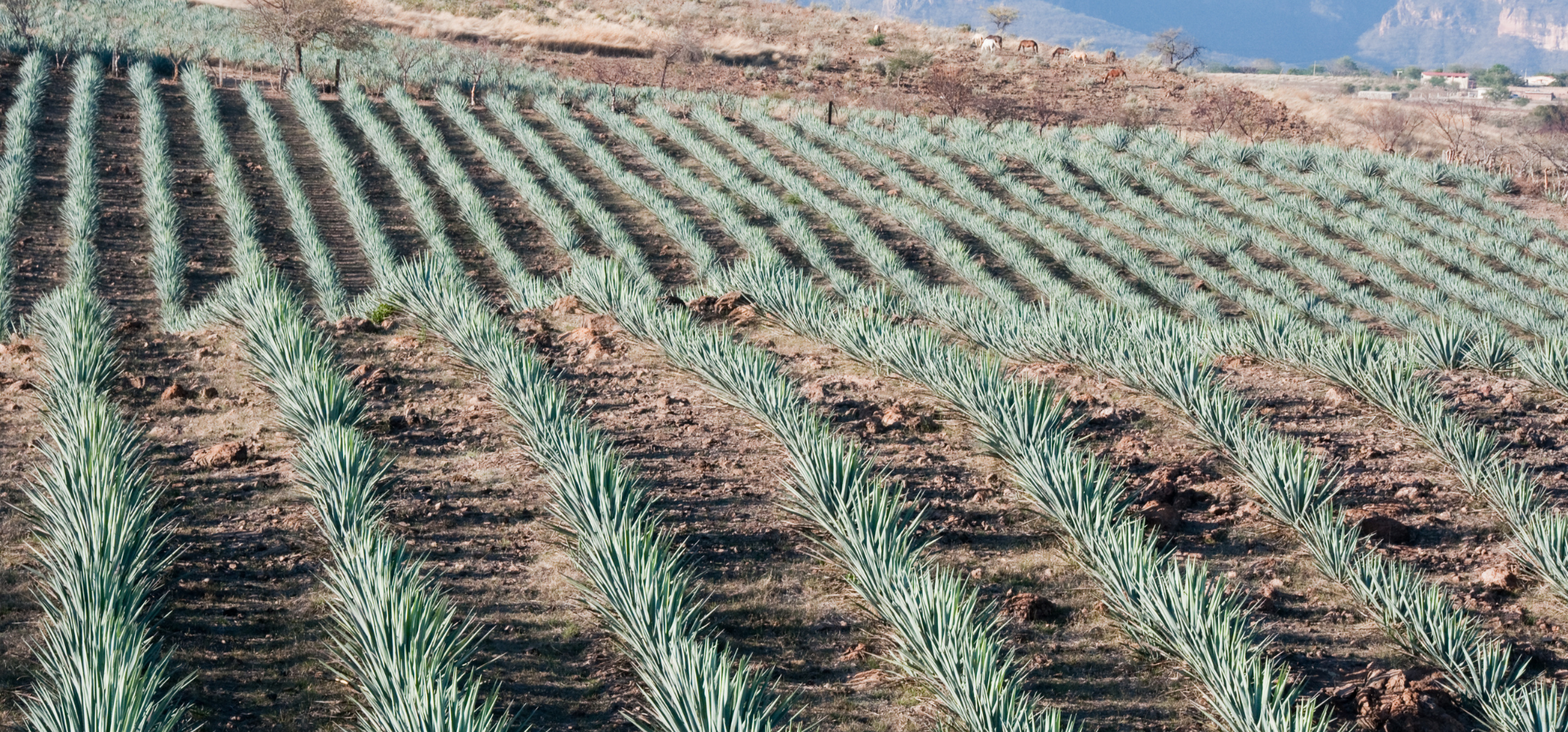
©AlbertoLoyo from Getty Images via Canva.com. Over the past years, the expansion of agave and avocado monocultures, driven by high demand from other countries, has caused massive deforestation in Mexico.
Panel discussion: Challenges and priorities for sustainable agricultural planning in Mexico
Following the keynote, a panel discussion brought together stakeholders from government, academia, and international organizations to explore the practical challenges and priorities of implementing sustainable agricultural practices at the community level in Mexico.
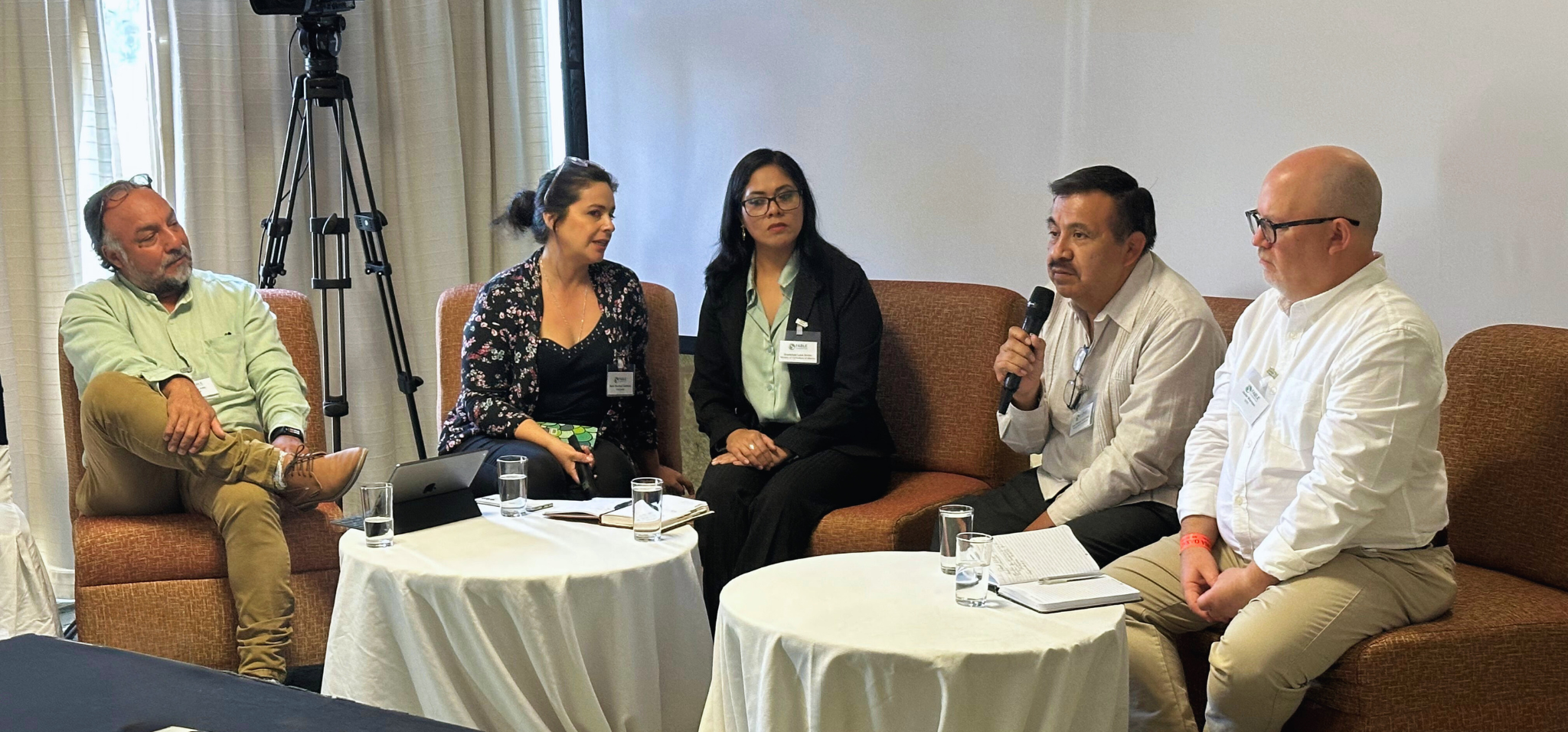
From left to right, Salvador Anta, Coordinator in the Northern Mountain Range of Oaxaca (GAIA); translator; Guadalupe Luna Arvizu, Deputy Director of Public Policy Forecasting, Ministry of Agriculture of Mexico; Juan Manuel Torres Rojo, FABLE Mexico (U. Iberoamericana); Javier Warman, Forests Director (WRI Mexico).
A central challenge identified in the discussion was the integration of agricultural production and sustainability within land-use decisions. Panelists emphasized the importance of food self-sufficiency as a key priority in Mexico's political agenda and stressed that aligning climate and agricultural policies is crucial to achieving this goal. Other challenges included the isolation of farmers' organizations from past agricultural policies, their lack of coordination, and the need to promote rural development beyond simple resource transfers. Additionally, scaling sustainable practices across regions remains difficult due to the significant local and regional differences in Mexico.
Panelists further highlighted the need for effective policy implementation that bridges local realities with national frameworks. This includes establishing clear standards for monitoring and evaluation, and ensuring that knowledge sharing is promoted across different groups and organizations. Support for smallholder farmers, along with updated data to guide government decision-making, was also seen as essential, particularly given the diverse conditions across Mexico’s subnational territories.
While central government guidelines are crucial, the panel noted that subnational governments have the greatest potential for driving sustainable solutions. However, this potential can only be realized if state governments are genuinely committed to sustainability. Certain states have been at the forefront of sustainable agricultural practices, and they can serve as examples for others to follow. Finally, academia was recognized as playing a pivotal role in aligning and integrating land-use planning instruments across sectors, contributing to a more cohesive approach to sustainable land use.
How can FABLE contribute to policy efficiency
Panelists discussed ways in which the FABLE methodology can improve policy efficiency. These include assessing the impact of policy mixes, proposing methods to evaluate progress, and identifying levers for change. A notable example of the FABLE approach in action is the collaboration with Mexico’s Secretariat of Agriculture and Rural Development (SADER). Since 2019, FABLE Mexico has worked with SADER to assess the impact of specific policies, particularly related to corn production. This partnership allowed for the creation of a policy pathway and an integrated analysis of its effects on ecosystems and landscapes. The resulting data has helped policymakers understand the national impact of their decisions and align them with international commitments, while also identifying crucial data gaps.
Exploring the Agroecological Module in the FABLE-Calculator
At the meeting, FABLE teams played a hands-on game exploring the agroecological module of the FABLE-Calculator. In this interactive session, participants used the calculator to develop pathways aimed at minimizing cropland area, maximizing biodiversity, and enhancing climate mitigation efforts. This session illustrated the trade-offs and synergies between different land-use objectives and how challenging it can be to meet various environmental outcomes simultaneously.
Some groups focused on reducing cropland areas and succeeded in decreasing agricultural land use while improving biodiversity and reducing emissions. Others focused on climate mitigation, discovering that organic farming was highly effective in increasing soil organic carbon (SOC), although this sometimes conflicted with biodiversity goals due to the need to expand cropland. Lastly, groups concentrating on biodiversity found that a mix of practices often outperformed focusing on a single strategy, highlighting the complexity of balancing multiple sustainability goals.
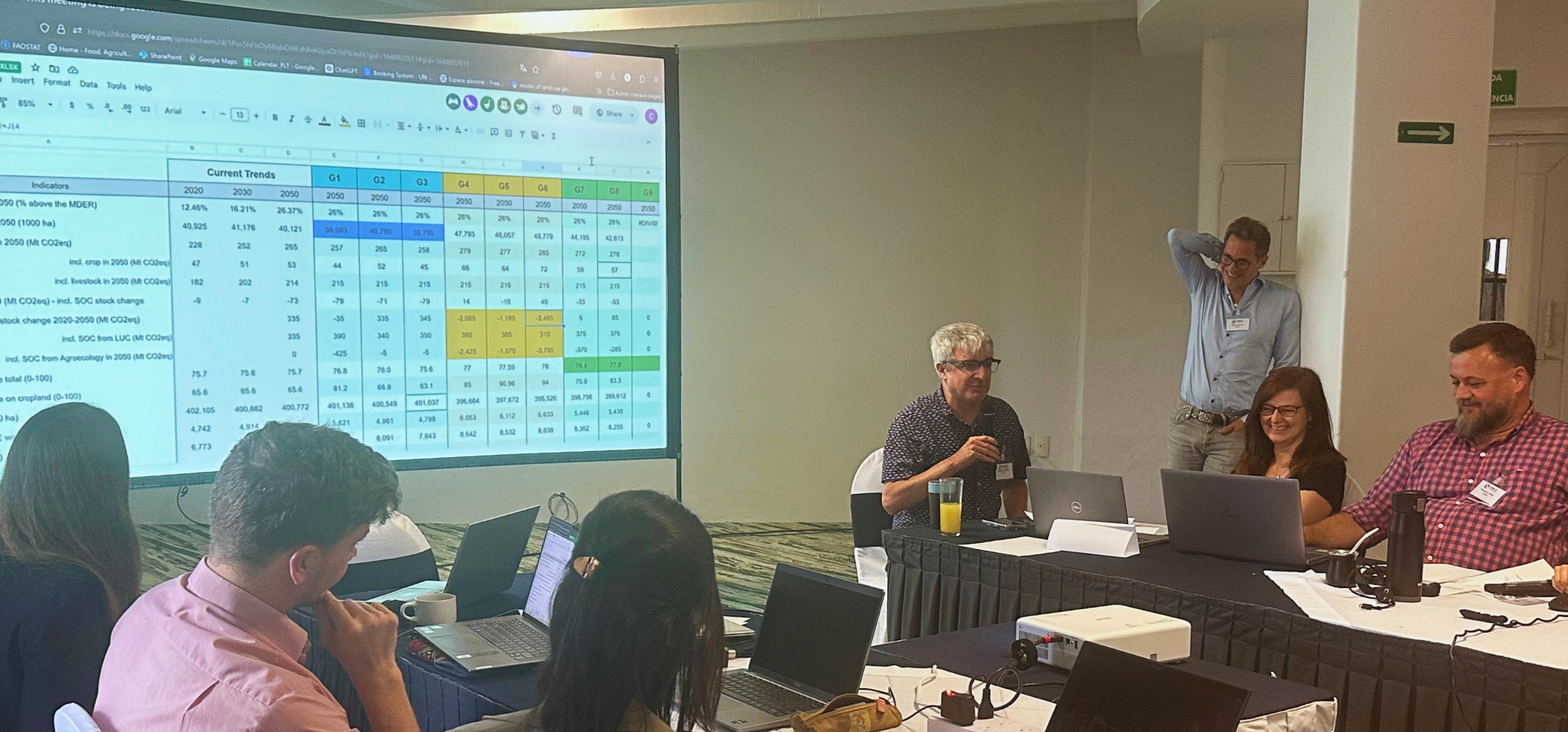
Participants were able to compare the results by group, and exchange on their different strategies to meet the biodiversity protection objectives, through the use of the module on agroecological practices in the FABLE Calculator.
Strategy session: Shaping the future of FABLE
The strategy session explored the future direction of the FABLE Consortium, with contributions from various country teams. The session highlighted FABLE’s strength in adapting local contexts to global discussions and its potential to drive sustainable land-use planning. Teams showcased how the FABLE Calculator has been used in workshops with stakeholders, sparking important conversations about trade and land-use policies. They also emphasized the importance of context when applying tools like the FABLE Calculator, ensuring they align with the realities of national and subnational policies.
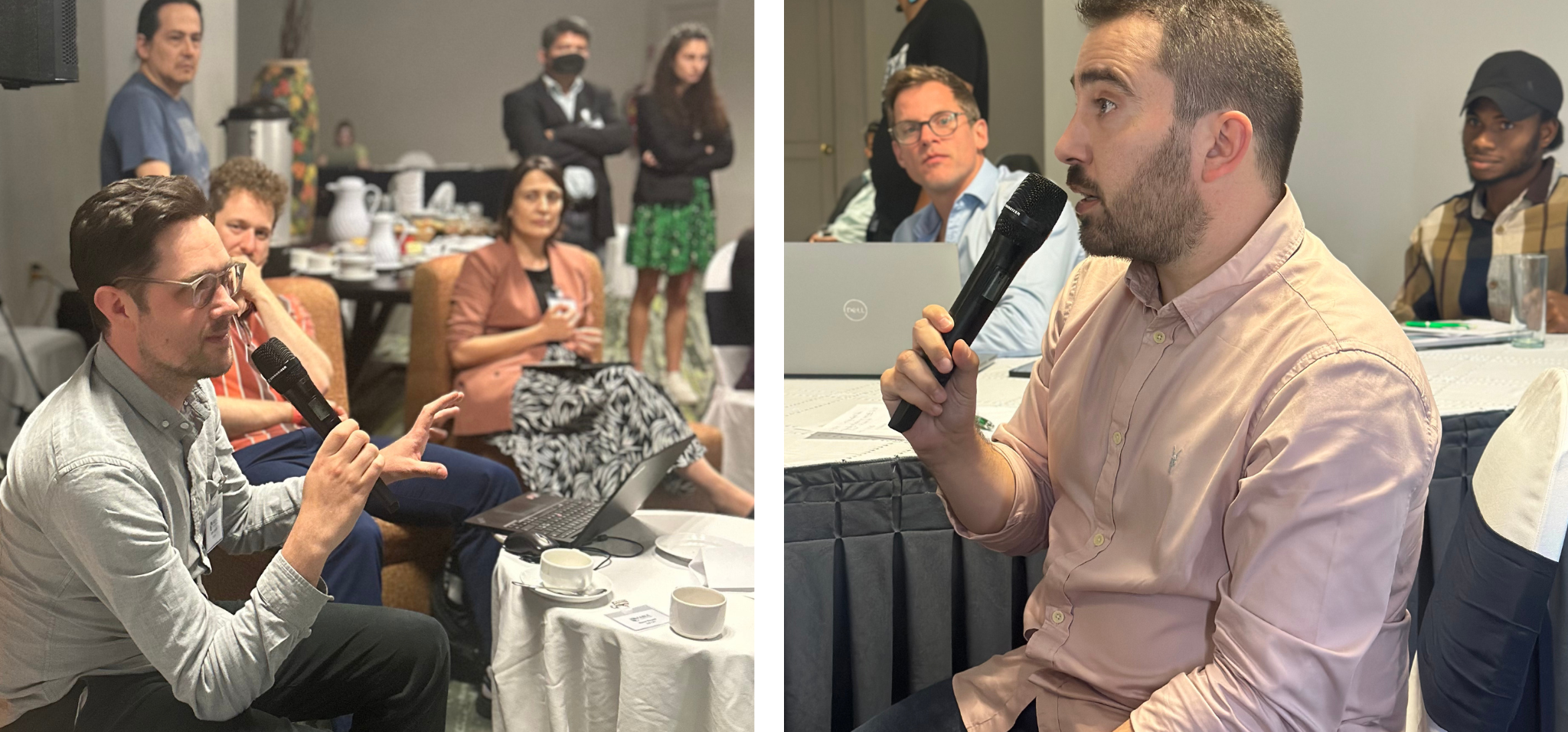
Country teams shared their experiences engaging with governments and highlighted the value that FABLE tools bring to local policy decision-making.
Taking the FABLE Scenathon one step further
The final session introduced two innovative approaches for the Scenathon infrastructure, which allows users to run interactive scenarios and explore the effects of various policy mixes on land-use and sustainability goals. The updated infrastructure will support country teams in running mini-scenathons, helping users analyze national and global pathways in real time. This feature will enable FABLE teams to engage in dynamic decision-making processes and refine policies with a focus on scalability and adaptability.
Ways forward: A collaborative approach to sustainable land use
The 15th FABLE Consortium meeting in Oaxaca proved to be an invaluable platform for exchanging ideas, exploring tools like the FABLE-Calculator, and strengthening the global network of country teams committed to sustainable land-use practices. The discussions underscored the critical role of local context in shaping effective policies and highlighted the need for continued collaboration between governments, academia, and civil society to ensure land-use decisions support climate mitigation, biodiversity protection, food security, and rural development goals.
